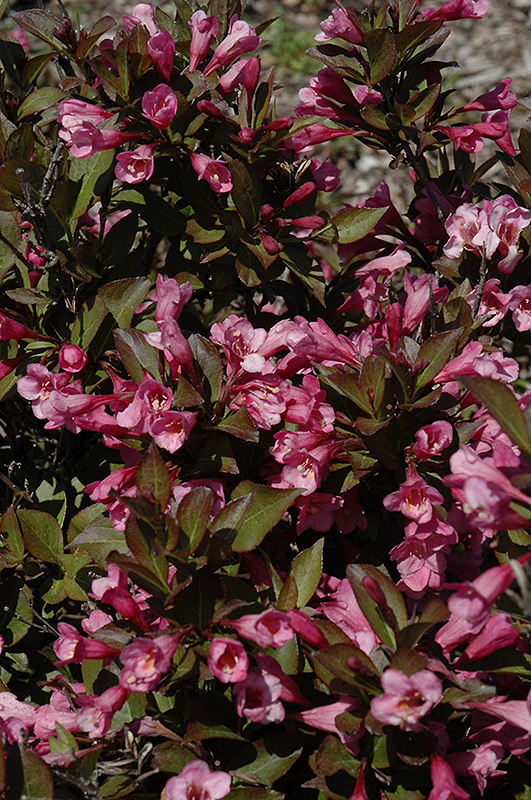Height: 3 feet
Spread: 3 feet
Sunlight:
![]()
Hardiness Zone: 3b
Description:
A neat and compact flowering shrub covered in soft pink flowers with deeper pink bases, attractive to hummingbirds, foliage emerges with a copper tint fading to a deep dark green; rather reserved the rest of the year, needs full sun
Ornamental Features
Samba Weigela features showy clusters of shell pink trumpet-shaped flowers with yellow throats and a rose reverse along the branches from late spring to mid summer. It has attractive purple-tipped dark green foliage which emerges coppery-bronze in spring. The pointy leaves are highly ornamental but do not develop any appreciable fall color.
Landscape Attributes
Samba Weigela is a multi-stemmed deciduous shrub with a more or less rounded form. Its average texture blends into the landscape, but can be balanced by one or two finer or coarser trees or shrubs for an effective composition.
This shrub will require occasional maintenance and upkeep, and should only be pruned after flowering to avoid removing any of the current season's flowers. It is a good choice for attracting hummingbirds to your yard. It has no significant negative characteristics.
Samba Weigela is recommended for the following landscape applications;
- Mass Planting
- Hedges/Screening
- General Garden Use
- Container Planting
Planting & Growing
Samba Weigela will grow to be about 3 feet tall at maturity, with a spread of 3 feet. It has a low canopy. It grows at a medium rate, and under ideal conditions can be expected to live for approximately 30 years.
This shrub should only be grown in full sunlight. It prefers to grow in average to moist conditions, and shouldn't be allowed to dry out. It is not particular as to soil type or pH. It is highly tolerant of urban pollution and will even thrive in inner city environments. This is a selected variety of a species not originally from North America.
Samba Weigela makes a fine choice for the outdoor landscape, but it is also well-suited for use in outdoor pots and containers. Because of its height, it is often used as a 'thriller' in the 'spiller-thriller-filler' container combination; plant it near the center of the pot, surrounded by smaller plants and those that spill over the edges. It is even sizeable enough that it can be grown alone in a suitable container. Note that when grown in a container, it may not perform exactly as indicated on the tag - this is to be expected. Also note that when growing plants in outdoor containers and baskets, they may require more frequent waterings than they would in the yard or garden. Be aware that in our climate, most plants cannot be expected to survive the winter if left in containers outdoors, and this plant is no exception. Contact our experts for more information on how to protect it over the winter months.


